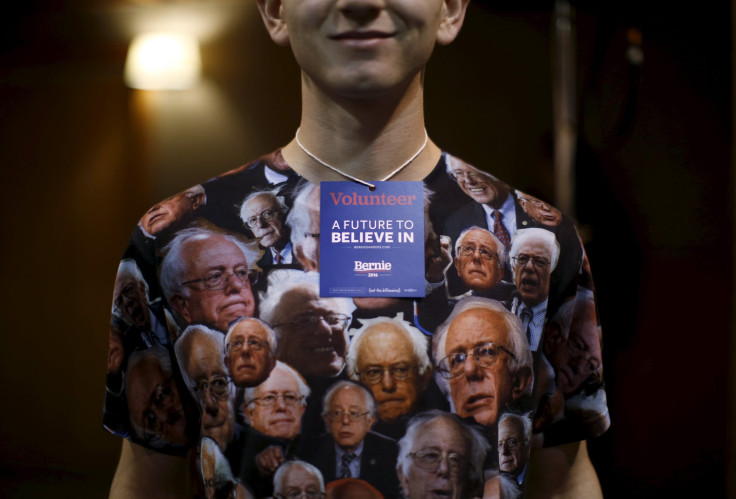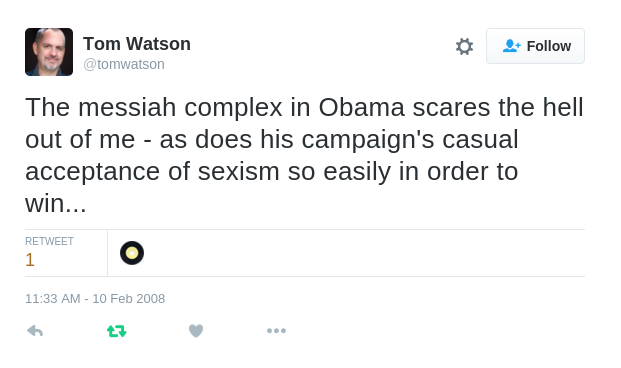‘Bernie Bros’ And ‘Obama Boys’: Echoes Of 2008 In Media’s Clinton-Sanders Pundit Clash

In case you are not a member of the media class, or a regular consumer of political think pieces, you may be unfamiliar with one of the stranger twists of the 2016 campaign, the emergence of so-called “Bernie Bros” — angry young men whose enthusiasm for Bernie Sanders makes them condescending and even misogynistic toward female supporters of Hillary Clinton. Even moderate political junkies would have to be deep into Twitter and the blogosphere to have come across the term so far, but rest assured, it is tearing the world of online politicos apart.
It’s only over the last week or so that the Bernie Bro narrative has crept into actual campaign rhetoric, from both the Clinton and Sanders camps. But even people plugged into the esoteric media hype may be surprised to find that this same fight played out eight years ago, at a slightly lower volume, when then-Illinois Sen. Barack Obama squared off against Hillary Clinton, then a senator from New York, for the Democratic nomination.
Today’s Bernie Bro phenomenon, sketched out by critics over the past few months, is simple enough: The 2016 Democratic presidential race, which pits Sen. Sanders of Vermont, a male socialist, against Clinton, a female party establishment grandee, has allegedly spawned a toxic class of male Sanders supporters who badger, mock and harass female Clinton fans, mostly online. The thesis was first written up (by a male author) in the Atlantic last October, and produced sequels from different writers, most of them women.
Over the course of several think pieces, the portrait of the Bernie Bro began to mutate from a largely harmless boor to a very nasty character when it was elaborated on by Mashable (“The bros who love Bernie Sanders have become a sexist mob”), New York magazine, Salon and a whole lot of Twitter feeds. The pieces cite harassment from scores of social media accounts and dismissive mockery from certain progressive sites.
But a look back at 2008 shows a quiet dress rehearsal of this same fight.
‘Obama Boys’
Veteran observers of the 2008 election, of course, remember sexism as a hot-button issue during the showdown between Clinton and Obama. Hillary supporters hit the young senator hard for several slights that many felt were gendered (“you’re likable enough, Hillary”), and her campaign returned to these charges more frequently as the race dragged on.
But that broadside gave life to a more specific narrative in the blogosphere: the scourge of the “Obama Boy,” a term coined in a 2008 Salon headline , though not the body, of a piece by Rebecca Traister, one of same authors who has repeatedly weighed in on the Bernie Bro this season. In the 2008 piece, Traister described women who, while sympathetic to Obama if not outright supportive, felt alienated by latent and sometimes not-so-latent sexism from male supporters .
“You already see this idealistic longing projected on Obama,” says one woman interviewed by Traister. “People talk about him as a secular messiah who will bring us political salvation. There’s no sense of what is plausible.” Unchecked idealism is also one key aspect of the Bernie Bro, as the Atlantic wrote last year: “The Berniebro doesn’t really have a good answer when you ask why the Democratic Party, which has spent six years explaining how its market-based healthcare policies aren’t socialist, would ever find national success nominating an actual democratic socialist.”
The 2008 piece also suggests that sexism clouds Obama Boys’ judgment of the facts, causing them to ignore Hillary’s “more progressive” healthcare plan (probably not the case today) in favor of the young man from Chicago. Back to the Bernie Bro manual: “The Berniebro has spent most days since March 2008 in an environment where bland support for Barack Obama was so presumed as to be unspoken.”
Tom Watson, hunter of Bernie Bros and founder of the organization #HillaryMen along with Peter Daou, a former adviser to Clinton and the Clinton Global Initiative, has recently been deleting tweets from 2008 in which he slammed Obama in tones he now reserves for the Sanders camp. “The messiah complex in Obama scares the hell out of me — as does his campaign's casual acceptance of sexism so easily in order to win,” he wrote in one of them.

Current Wonkette editor and then-Daily Kos blogger Kaili Joy Gray went a little bit further. “Sometimes, you let your passion get the best of you,” she wrote to Obama-supporting Daily Kos contributors in a post eulogizing the Clinton campaign, “and you posted really, really, really, really nasty comments. (Come on, admit it. You know you did.)”
Gray then concluded with this: “I am sad. I am sad that I will not get to vote for Hillary in November. And, at the risk of opening myself up to accusations of racism, I will even admit that I'm sad that once again, it would appear that a black man gets there first. First to vote, first to be elected, first to the Supreme Court. I don't deny the importance of it; it would be nice, though, if just once, a woman could break through first.” She then made reference to the fractured Democratic Party recovering from a “civil war.”
These writers and their supporters say that they were pushing back against sexism then, and they’re doing it again now. To their opponents, it’s just more evidence of a crutch Clintonites lunge for when their candidate is on the ropes.
The upshot is that social media was nowhere near as mainstream in 2008, so the battle of the Obama Boys drew a much smaller crowd back then, confined to comment sections and private messages. This time around, these arguments are far more amplified, and there’s a real path for ideas that get posted on Twitter to end up in TV panels and a campaign rallies.
Don’t Bernsplain Me, Bro
Naturally, the Bernie Bro thesis sparked a defense of Sanders fans, most of whom see the entire narrative as a few anecdotes blown up out of proportion, if not a coordinated campaign of defamation. Female Sanders supporters and Clinton critics, in particular, have voiced frustration at being dismissed by the Clinton people as irrelevant — or even, as feminist icon Gloria Steinem said last week in a statement she has since walked back, just desperate for male approval. Pieces in the New Republic , the Village Voice, and Baffler magazine have aired some of these countercritiques.
The fact is that there is currently no way to quantify how widespread the so-called Bernie Bro attitude is — whether there is a significant contingent of Sanders fans who, like fans of many things online, are misogynistic vulgarians, or whether the whole thing is being inflated. Critics certainly cite the amoebic, anecdotal quality of the Bernie Bro charge while brushing it off. And in one case, an offending “Bro” account cited by writers at Mashable, the New Republic, the New Yorker and Gray at Wonkette turned out to be a hoax.
Another oft-cited example of Bernie Bro-ism is the jarring cover of leftist writer Doug Henwood’s recent anti-Hillary polemic, “My Turn,” which features a painting of cold-eyed Clinton pointing a gun at the reader. But again, things are a bit more complicated than they appear, as International Business Times reported last winter that this image was conceived and painted by a female diehard Clinton supporter who gave Henwood her blessing. (Critics emphasize that the context of the image on Henwood’s book renders its origins irrelevant.)
But another clear fact is that many women, in Twitter feeds, comment sections and their own posts are complaining about harassment. Sanders’ own campaign seems to consider this reason enough to address and discourage anything like that kind of behavior:
if you support @berniesanders, please follow the senator's lead and be respectful when people disagree with you.
— mike casca (@cascamike) January 26, 2016
Whatever the scope of the problem, Clinton supporters are making it an issue, starting with Bill Clinton himself. The former president declared last Sunday that Sanders supporters have a sexism problem. The Nation's Joan Walsh one of the most prominent writers complaining of Bernie Bros — who has also disclosed that her daughter works for Clinton — got a name check.
“[Walsh] and other people who have gone online to defend Hillary, to explain why they supported her, have been subject to vicious trolling and attacks that are literally too profane often, not to mention sexist, to repeat,” Bill Clinton said.
That same day, Sanders felt strongly enough to weigh in, bluntly. "Look, we don't want that crap,” the senator said. “You know that anybody who supporting me that is doing the sexist things, we don't want them. I don't want that. That is not what this campaign is about.”
Bill Clinton targets Bernie Bros: "vicious trolling attacks that are literally too profane, not to mention sexist" against HRC supporters
— Annie Karni (@anniekarni) February 7, 2016
For anyone outside of the press and think piece circuit digesting this debate day in and day out, the meaningful question is whether the idea of “Bernie Bros” will begin to cause political problems for Sanders, or even cost him supporters en masse.
So far, that doesn’t appear to be the case: It’s worth mentioning that Sanders attracts more young people, and by some measurements, more young women, than Clinton. In Iowa, young women voted for Sanders over Clinton by a margin of 6 to 1, according to the Associated Press. A USA Today/Rock the Vote poll published last month indicated that voting-age Democratic women under 35 favor Sanders by 20 points over Clinton nationally.
The gender gap shows that, so far, Sanders hasn’t suffered for the Bernie Bro narrative. The most that average voters have heard about it is that Sanders has told sexist supporters, a potential problem for anyone opposing a female candidate, to cease and desist.
Meanwhile, the youth gap suggests that it’s more likely that Sanders supporters are the ones you’ll see online. That means there are more on Facebook, more on Twitter, and more on Reddit. And if you’re online, you’re more likely to be getting into what the internet used to call a “flame war.”
Media critic Amanda Hess broke past the media navel-gazing when she observed that unfortunately, “the nation’s pollsters have been busy asking Americans who they plan to vote for in the real election, not which faction is the most intolerant on the internet.” And while it’s true that social media is a wildly more relevant and powerful force in 2016 than back in 2008, it still remains to be seen whether the Bernie Bro kerfuffle — whatever its origins, scope and size — has the power to affect Sanders’ strong support among women and millennials who live at least some part of their lives offline.
© Copyright IBTimes 2024. All rights reserved.






















